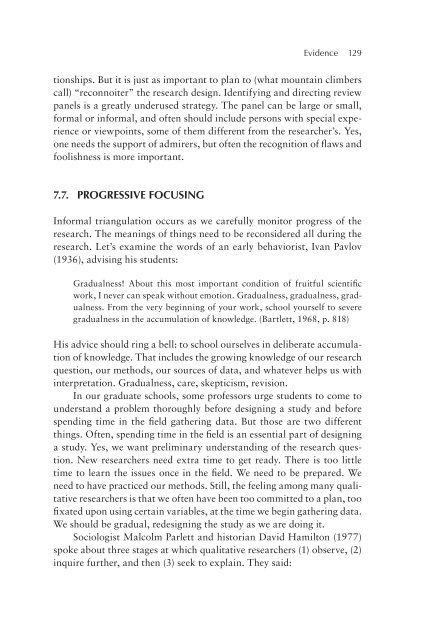How Things Work - Doha Academy of Tertiary Studies
How Things Work - Doha Academy of Tertiary Studies
How Things Work - Doha Academy of Tertiary Studies
You also want an ePaper? Increase the reach of your titles
YUMPU automatically turns print PDFs into web optimized ePapers that Google loves.
evidence 129<br />
tionships. But it is just as important to plan to (what mountain climbers<br />
call) “reconnoiter” the research design. Identifying and directing review<br />
panels is a greatly underused strategy. The panel can be large or small,<br />
formal or informal, and <strong>of</strong>ten should include persons with special experience<br />
or viewpoints, some <strong>of</strong> them different from the researcher’s. Yes,<br />
one needs the support <strong>of</strong> admirers, but <strong>of</strong>ten the recognition <strong>of</strong> flaws and<br />
foolishness is more important.<br />
7.7. PROGRessive FOcusiNG<br />
Informal triangulation occurs as we carefully monitor progress <strong>of</strong> the<br />
research. The meanings <strong>of</strong> things need to be reconsidered all during the<br />
research. Let’s examine the words <strong>of</strong> an early behaviorist, Ivan Pavlov<br />
(1936), advising his students:<br />
Gradualness! About this most important condition <strong>of</strong> fruitful scientific<br />
work, I never can speak without emotion. Gradualness, gradualness, gradualness.<br />
From the very beginning <strong>of</strong> your work, school yourself to severe<br />
gradualness in the accumulation <strong>of</strong> knowledge. (Bartlett, 1968, p. 818)<br />
His advice should ring a bell: to school ourselves in deliberate accumulation<br />
<strong>of</strong> knowledge. That includes the growing knowledge <strong>of</strong> our research<br />
question, our methods, our sources <strong>of</strong> data, and whatever helps us with<br />
interpretation. Gradualness, care, skepticism, revision.<br />
In our graduate schools, some pr<strong>of</strong>essors urge students to come to<br />
understand a problem thoroughly before designing a study and before<br />
spending time in the field gathering data. But those are two different<br />
things. Often, spending time in the field is an essential part <strong>of</strong> designing<br />
a study. Yes, we want preliminary understanding <strong>of</strong> the research question.<br />
New researchers need extra time to get ready. There is too little<br />
time to learn the issues once in the field. We need to be prepared. We<br />
need to have practiced our methods. Still, the feeling among many qualitative<br />
researchers is that we <strong>of</strong>ten have been too committed to a plan, too<br />
fixated upon using certain variables, at the time we begin gathering data.<br />
We should be gradual, redesigning the study as we are doing it.<br />
Sociologist Malcolm Parlett and historian David Hamilton (1977)<br />
spoke about three stages at which qualitative researchers (1) observe, (2)<br />
inquire further, and then (3) seek to explain. They said:

















